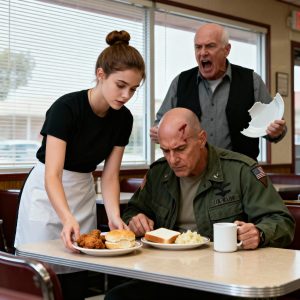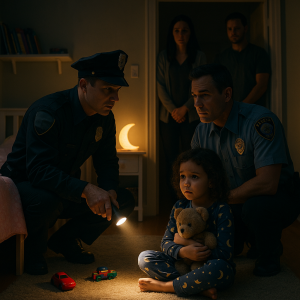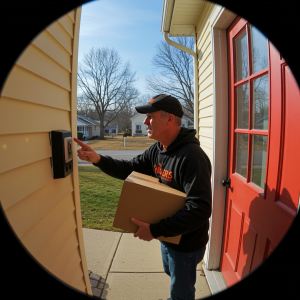The Storm and the Sanctuary
The October rain struck Murphy’s Truck Stop like nature’s own percussion section, each drop a thunderous beat against weathered windows. Past midnight, the fluorescent-lit haven sheltered only the usual suspects: weary truckers clutching steaming mugs and a cluster of bikers who’d sought refuge from the tempest outside.
In the farthest corner booth sat Vincent “Bear” Thompson—a mountain of a man whose presence commanded attention without asking for it. Fifty-five years had carved character into his weathered face, and his six-foot-four frame carried stories written in ink across massive arms: two decades serving his country, followed by fifteen years leading the Iron Ravens Motorcycle Club. His steel-gray beard, adorned with tiny metal rings, framed eyes that had seen too much of life’s darker chapters.
Most folks crossed the street when they saw Bear coming. Tonight, he was about to become somebody’s miracle.
The sound was barely a whisper—so faint that the other patrons never noticed it cutting through the diner’s white noise. But Bear’s military-trained ears caught the muffled sob drifting from the restroom area, a sound that made something deep in his chest tighten with recognition.
From the women’s bathroom emerged a ghost of a child—maybe eight years old, moving like someone who’d learned that drawing attention meant pain. His oversized clothes hung like hand-me-down hopes, sneakers bound together with silver tape, and even across the dimly lit space, Bear could read the story written in bruises: the puffy cheek, the protective way he cradled his left arm, the thousand-yard stare that belonged on no child’s face.
The boy shuffled to the vending machine, tiny fingers diving deep into empty pockets before producing a pitiful collection of coins. Sixty cents, maybe less. His hungry eyes fixed on candy bars priced at a dollar-fifty, and his stomach’s growl echoed like thunder in the quiet space.
“Evening, partner,” Bear’s voice rumbled soft as distant thunder, gentler than anyone who knew his reputation would believe possible. “Looks like you could use a friend.”
Terror flashed across the child’s features as he registered Bear’s intimidating presence. He stumbled backward, but Bear raised both hands in surrender.
“Easy there,” Bear continued, deliberately staying seated to minimize his threatening silhouette. “Just thought you might be hungry. No catch, no strings.”
The boy’s eyes darted around the diner like a cornered animal checking escape routes. “Mama always said never talk to people you don’t know,” he whispered.
“Your mama sounds like a smart lady,” Bear agreed. “She raise you right?”
The child’s face crumpled like paper in rain. “She did, before God took her home.”
Something sharp twisted behind Bear’s ribs. “What do folks call you, son?”
“Tyler. Tyler Morrison.” The name floated between them like a prayer. “I should be sleeping, but I can’t… I just can’t go back there tonight.”
“Where’s ‘there,’ Tyler?”
Tyler’s attention snapped to the parking lot as headlights swept across the windows. A police cruiser pulled up, and instead of relief, pure terror painted the boy’s features.
“That’s Officer Bradley,” Tyler’s voice shook like autumn leaves. “He’s gonna drag me back to Uncle Ray’s. He always does.”
The way Tyler spoke his uncle’s name sent warning signals screaming through Bear’s mind. Twenty years of military service and fifteen leading troubled men had taught him to recognize the signs of systematic destruction of innocence.
Officer Jim Bradley pushed through the diner’s door—a middle-aged cop wearing exhaustion like a second uniform. He spotted Tyler immediately and approached with the weary familiarity of someone repeating an unwelcome ritual.
“There’s our wandering boy,” Bradley sighed, his tone suggesting this dance had been performed before. “Your uncle’s worried sick. Says you disappeared after supper again. Come along, let’s get you where you belong.”
Tyler pressed himself against the wall like he was trying to melt into it. “Please don’t make me go. Please. I’ll behave, I swear. I won’t run anymore.”
“Kid’s got an overactive imagination,” Bradley explained to Bear, apparently feeling the need to justify the situation to the dangerous-looking biker. “Lives with his uncle since losing his mother. Gets mixed up sometimes, creates elaborate tales. Ray Morrison’s solid gold—works for the power company, volunteers coaching kids’ baseball. Boy’s just struggling with the adjustment.”
But Bear was studying Tyler’s reaction to Bradley’s words, and what he witnessed confirmed his darkest suspicions. This wasn’t a confused child spinning fantasies. This was a prisoner trapped in hell, abandoned by every system designed to protect him.
“Officer,” Bear said carefully, “maybe Tyler could sit a spell before heading home? Kid looks like he could use some food and time to settle down.”
Bradley’s demeanor shifted to suspicion as he really looked at Bear for the first time. “And you would be?”
“Vincent Thompson. I coordinate youth mentoring through my motorcycle organization. We work with kids facing tough circumstances.”
Technically true, though their program existed more in planning than practice. Bear’s club had discussed community outreach, but nothing formal had launched yet. The white lie felt justified under the circumstances.
“Appreciate the concern, but Tyler needs to get home. School in the morning,” Bradley said with finality.
But when Bradley reached for Tyler’s shoulder, the child released a sound of pure animal terror and bolted—not toward the exit, but straight to Bear, wrapping thin arms around the big man’s waist and burying his face in worn leather.
“Don’t let him take me,” Tyler sobbed against Bear’s vest. “Uncle Ray promised if I ever told anybody about nighttime, he’d kill me and make it look accidental, just like what happened to Mama.”
The words hit Bear like shrapnel. Tyler’s mother hadn’t died accidentally—she’d been murdered by Ray Morrison, who’d somehow maneuvered himself into custody of the only witness who could expose his crime.
Officer Bradley’s face drained of color. “Tyler, you can’t make accusations like that. Your uncle cares about you. Your mother passed in a car crash, remember? We’ve discussed this repeatedly.”
“No!” Tyler screamed, his voice echoing off cheap tiles. “Uncle Ray ran her car off the road! I watched him! His hands were bloody when he picked me up from school!”
Bear noticed his fellow Iron Ravens—Diesel, Snake, and Hammer—had risen from their table and were moving closer, reading the situation with the intuitive understanding that came from years of having each other’s backs.
“Officer Bradley,” Bear’s voice carried new steel, “seems like Tyler’s claims deserve serious consideration. If there’s even a remote possibility he’s in danger—”
“There’s no possibility,” Bradley cut him off, but his defensive tone suggested otherwise. “Ray Morrison is a pillar of the community. These accusations are severe, and Tyler’s obviously traumatized. Children who’ve lost parents often construct elaborate fantasies to process grief.”
“Then investigating those fantasies thoroughly shouldn’t be a problem,” came a new voice from across the diner.
Everyone turned toward a woman in her forties approaching their group. Despite the late hour, she was professionally dressed and carried herself with quiet confidence.
“Dr. Sarah Chen,” she said, displaying credentials. “Child psychologist specializing in trauma recovery. I was passing through, saw the patrol car, and decided coffee sounded perfect.”
Bear had never been more grateful for perfect timing.
Dr. Chen knelt to Tyler’s eye level, speaking with the practiced calm of someone who’d spent years working with wounded children. “Tyler, I’m Sarah. I’m a doctor who helps children who are frightened or hurt. Can you tell me what you’re afraid will happen if you go home tonight?”
Tyler looked between Dr. Chen and Bear, drawing strength from their unexpected alliance. “Uncle Ray drinks after dinner,” he said quietly. “He makes me take my clothes off and… does things. Bad things. He says all kids have to do these things with adults, but they can never tell or the adults get in trouble and kids go to jail forever.”
The silence that followed was deafening. Dr. Chen’s expression hardened into professional fury while Officer Bradley looked ready to lose his dinner.
“That’s a very serious claim, Tyler,” Dr. Chen said gently. “Have you tried telling other adults about this?”
Tyler nodded miserably. “I told my teacher, Mrs. Patterson. But Uncle Ray visited school and explained to her. He said I was having behavior problems because I missed Mama, and sometimes I confused dreams with reality. Mrs. Patterson believed him. Everybody always believes him.”
Bear felt rage building—not the hot, reckless anger of youth, but the cold, calculated fury of a man who’d learned to weaponize violence for righteous purposes.
“Dr. Chen,” he said carefully, “what’s the proper protocol for protecting a child reporting ongoing abuse?”
“Immediate removal from the dangerous environment pending thorough investigation,” she replied without hesitation. “Tyler should be placed in emergency protective custody while authorities examine his allegations.”
Officer Bradley shifted uncomfortably. “Look, I understand everyone’s worried, but Ray Morrison has been Tyler’s legal guardian for eight months. There’s never been evidence of abuse. The kid runs away regularly, shows up here spinning tales. Ray always retrieves him, and Tyler goes home safely.”
“Safely?” Bear’s voice dropped to a dangerous growl. “Kid’s sporting facial bruises and he’s terrified to go home. How exactly does that qualify as safe?”
“He fell off his bicycle yesterday. Ray mentioned it when he called.”
Tyler looked up at Bear with desperate eyes. “I don’t own a bicycle. Never had one. He hits me when I don’t obey fast enough.”
Dr. Chen stood and pulled out her phone. “I’m contacting Child Protective Services for emergency placement. This child is clearly in immediate danger.”
“Now wait just a minute,” Bradley protested. “You can’t simply—”
“Officer Bradley,” Dr. Chen’s voice carried the authority of someone accustomed to being obeyed, “I’m a mandated reporter, and I’ve just witnessed a child disclosing ongoing sexual abuse. I’m legally required to ensure his immediate safety. If you attempt returning him to his alleged abuser without proper investigation, I’ll file complaints with your department and the state child welfare system.”
Bear watched this exchange while maintaining a protective arm around Tyler, who still clung to his vest. The boy had stopped crying and was observing the adults with the wary attention of someone whose survival depended on accurately reading grown-up moods.
“Tyler,” Bear said quietly, “do you have other family you could stay with while the adults sort this out? Grandparents? Other relatives?”
Tyler shook his head. “Mama didn’t have family left. That’s why I had to live with Uncle Ray. The social worker said he was my only relative.”
“What about friends’ families? Someone from school?”
“Uncle Ray doesn’t allow friends over, and I can’t visit other kids’ houses. He says it’s because I might tell lies about our family and embarrass him.”
The systematic isolation was another red flag confirming Bear’s assessment. Tyler was being held prisoner by someone who’d carefully orchestrated perfect conditions for ongoing abuse.
Dr. Chen finished her call and rejoined the group. “CPS is dispatching someone immediately. Tyler will be placed in emergency foster care tonight while they begin investigating.”
“How long will that process take?” Bear asked.
“Depends on their findings. If Tyler’s allegations prove true, criminal charges will follow and he’ll receive long-term protective placement.”
“And if Ray Morrison is as persuasive with CPS as he apparently is with everyone else?”
Dr. Chen’s expression grew dark. “Then Tyler returns to a dangerous situation, and we pray for another opportunity to intervene before something worse occurs.”
Bear made a decision that would transform both their lives forever.
“There’s a third option,” he said slowly. “My motorcycle club has been developing a youth mentorship initiative. We work with kids aging out of foster care, children from broken homes, young people needing positive adult role models. If CPS needs temporary placement options, we could provide that.”
Officer Bradley nearly choked on his coffee. “You want to place an eight-year-old child with a motorcycle gang?”
“Not a gang. A club. Big difference.” Bear’s voice held the patience of someone who’d explained this distinction countless times. “We’re working men with families and community connections. We volunteer supporting veterans, organize charity rides for children’s hospitals, and maintain clean records as membership requirements.”
Tyler looked up at Bear with something resembling hope flickering in his eyes for the first time that evening. “You’d really do that? Even though you barely know me?”
Bear met the child’s gaze and saw himself at that age—scared, alone, failed by every adult supposed to protect him. “Son, sometimes family isn’t about blood relations. Sometimes it’s about people who choose to stand up for each other when everything’s on the line.”
Dr. Chen was studying Bear with professional interest. “Mr. Thompson, are you familiar with therapeutic foster care programs?”
“Can’t say I am, but I’m eager to learn.”
“It’s specialized placement for children who’ve experienced severe trauma. Foster families receive additional training and support to help kids heal from abuse and neglect.” She paused thoughtfully. “It’s unconventional, but if your club members would undergo background checks, training, and home studies, it might be exactly what Tyler needs.”
“How so?”
“Tyler has been failed by traditional authority figures—police officers who dismiss him, teachers who don’t believe his reports, social workers who can’t see through his uncle’s manipulation. He needs protectors who exist outside those systems, people whose primary loyalty is to him rather than maintaining institutional credibility.”
Officer Bradley looked deeply uncomfortable. “I still think we’re overreacting to a traumatized child’s fantasies.”
“Then you shouldn’t mind us investigating those fantasies thoroughly,” Dr. Chen replied coolly. “If Ray Morrison is innocent, proper investigation will vindicate him. If he’s not…” She let the implication linger.
Twenty minutes later, CPS caseworker Maria Santos arrived at the diner. A weary-looking woman in her thirties who’d clearly been pulled from other obligations to respond to this emergency call.
After speaking privately with Tyler and reviewing Dr. Chen’s preliminary assessment, Santos confirmed what everyone suspected: Tyler required immediate protective placement while his allegations underwent investigation.
“Unfortunately,” Santos said, “our emergency placement options tonight are extremely limited. The best I can offer is a group home forty miles away, and frankly, it’s not ideal for a traumatized child.”
“What about Mr. Thompson’s proposal?” Dr. Chen asked.
Santos looked at Bear skeptically. “You’re volunteering to serve as a therapeutic foster parent? Do you have experience with traumatized children?”
“Military service in combat theaters,” Bear replied. “Construction work with at-risk youth initiatives. Twenty years leading a motorcycle club, which means handling members struggling with PTSD, substance abuse, family crises, and everything else life hurls at people.”
“It’s highly irregular,” Santos admitted, “but given the circumstances and lack of superior alternatives…” She retrieved paperwork from her briefcase. “We could arrange emergency temporary custody while completing background checks and home assessments. If everything verifies, we could discuss longer-term arrangements.”
Tyler had been listening with growing anxiety. “Does this mean I don’t have to return to Uncle Ray’s house?”
“Not tonight,” Santos assured him. “And not until we’ve thoroughly investigated your reports.”
For the first time since Bear had noticed him, Tyler smiled.
The following hours blurred with paperwork, phone calls, and coordination between multiple agencies. Bear contacted his club members to explain the situation and request their support in what was becoming their most crucial mission.
By sunrise, Tyler was settled in the guest bedroom of Bear’s house—a modest two-bedroom home that had felt cavernous since Bear’s divorce three years prior. The room had been hastily prepared with fresh sheets, some books, and a stuffed animal contributed by Hammer’s daughter when she learned about the frightened little boy needing comfort.
Tyler perched on the bed’s edge, still wearing his oversized clothes, clutching the stuffed elephant and surveying the room as if unable to believe he was truly safe.
“This is really mine?” he asked Bear. “Just for me?”
“For as long as you need it,” Bear confirmed. “There’s a lock that only works from inside. Nobody can enter unless you want them to.”
Tyler’s eyes filled with tears of relief. “Uncle Ray always said locks were dangerous. That kids might lock themselves in and get scared.”
Bear knelt beside the bed, positioning himself at Tyler’s eye level. “Tyler, I need you to understand something crucial. What happened at your uncle’s house—that’s not normal. Adults should never hurt children or force them into situations that feel scary or wrong. You did exactly right by telling someone, even though it was terrifying.”
“But what if Officer Bradley was correct? What if Uncle Ray is good and I’m just confused?”
“Then we’ll discover that through proper investigation. But regardless, you’re safe here. My responsibility is protecting you, not judging whether your memories are flawless. Kids who’ve been scared don’t always remember details perfectly, and that’s okay. What matters is ensuring you’re not scared anymore.”
Over the subsequent weeks, as Tyler’s story underwent investigation and corroboration, the truth emerged in horrifying detail. Ray Morrison had indeed murdered Tyler’s mother when she discovered his abuse of her son. He’d orchestrated her “accident” to appear like a single-car crash on a stormy night, then manipulated the system to gain custody of the sole witness to his crime.
Investigation revealed Morrison had been abusing children for over a decade, using his youth sports coaching position to identify and groom victims. Tyler’s testimony, combined with physical evidence from Morrison’s residence and digital evidence on his computers, led to charges ensuring he’d spend his remaining years imprisoned.
But for Tyler, legal resolution mattered less than the daily reality of healing and growing in a place where he was genuinely wanted and protected.
Bear’s home became unofficial headquarters for what the Iron Ravens now called their “Guardian Initiative.” Club members rotated helping with Tyler’s care, teaching practical skills, and demonstrating what healthy adult relationships looked like.
Diesel taught Tyler motorcycle mechanics, showing him that tools were for building and repairing, not hurting people. Snake, a veteran battling his own PTSD, helped Tyler understand that being scared didn’t make him weak or damaged. Hammer’s wife became Tyler’s surrogate aunt, teaching cooking and helping with homework.
Most importantly, Tyler learned that adults could be trusted to honor their commitments. When Bear promised to be home by six o’clock, he arrived by six o’clock. When Snake scheduled Saturday fishing, they went fishing Saturday. When Dr. Chen assured Tyler his therapy sessions were confidential, she never violated that trust.
Six months after that stormy night at Murphy’s Truck Stop, Tyler was legally adopted by Bear through proceedings that generated statewide headlines. The story of the motorcycle club president who rescued an abused child captured public imagination, leading to speaking engagements, media interviews, and eventually formal partnership between the Iron Ravens and the state’s child welfare system.
The Guardian Initiative became a model replicated by motorcycle clubs nationwide. These were men society had often dismissed as dangerous outcasts, but who’d discovered purpose in protecting society’s most vulnerable members.
Tyler flourished in his new environment. His academic performance improved, nightmares decreased, and he began displaying the confidence and curiosity that childhood trauma had suppressed. He learned safe motorcycle riding, developed friendships with other children, and gradually began trusting that his new life was permanent rather than temporary.
On Tyler’s adoption anniversary, the Iron Ravens organized a celebration bringing together CPS workers, police officers, therapists, teachers, and dozens of club members from across the region. Tyler, now nine and visibly healthier and happier, addressed the assembled group to thank the people who’d saved his life.
“I used to think all adults were frightening,” he said, his voice clear and confident. “But Bear and his friends showed me that some adults are scary to bad people so they can protect good people. They taught me that family isn’t just about blood relations—it’s about who appears when you need them most.”
Bear wiped his eyes as Tyler continued, reflecting on how profoundly his own life had changed since that night. He’d discovered purpose beyond personal survival and success. He’d learned that protection wasn’t just about physical strength or intimidation, but about creating safe spaces where vulnerable people could heal and flourish.
The Guardian Initiative continued expanding, eventually collaborating with law enforcement agencies, social services, and therapeutic professionals to identify and protect at-risk children. The Iron Ravens and affiliated clubs became known not as outlaws or troublemakers, but as fierce defenders of innocence.
Tyler grew up surrounded by people who’d chosen to be his family, who’d seen a terrified child and decided his safety was worth risking their own comfort and reputation. He learned skills and values preparing him to become a protector himself, eventually joining the Marines like his adoptive father and later becoming a social worker specializing in child trauma.
The night that began with a small boy searching for coins to buy candy had evolved into a movement protecting hundreds of children and challenging assumptions about who could serve as heroes and guardians in society.
Bear kept a photograph on his desk of Tyler at eight—small and scared in ill-fitting clothes—beside a recent image of Tyler at eighteen, confident and strong in his Marine dress uniform. The transformation captured in those pictures reminded him daily that sometimes the most important battles aren’t fought on distant battlefields, but in protecting innocence close to home.
The Iron Ravens’ motto, emblazoned on patches worn by every member, reflected the lesson Tyler had taught them: “Strength Shields Innocence.” It was a vow they made to every child needing someone to stand between them and danger, and it was a promise they’d never broken.
Because once you’ve looked into a terrorized child’s eyes and chosen to become their shield against the world’s cruelty, you understand that true strength isn’t about what you can destroy—it’s about what you can protect, nurture, and help flourish.





